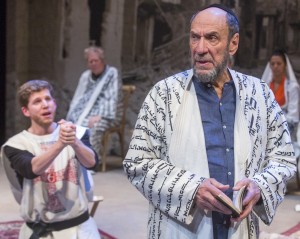The pleasures come out of left field in Nathan the Wise, a 1787 play by Gotthold Ephraim Lessing that most theater aficionados would not expect to see staged—if they had ever heard of it. Even Lessing never saw it produced; the original production, after his death in 1781, flopped. Schiller revised it for a successful 1801 production, and Goethe acclaimed it, and if not for the championship of those two great playwrights, it might still be gathering dust in a library in Deutschland. So artistic director Brian Kulick deserves kudos for choosing this rarity as his valedictory production before handing the reins of Classic Stage Company to John Doyle.
Lessing’s original runs more than four-and-a-half hours, according to adaptor/translator Edward Kemp, who has rendered the verse into prose and made massive cuts. What’s left still reflects Lessing’s Enlightenment respect for Judaism, Christianity and Islam. The conflict of the three great religions is interwoven in Lessing’s plot, which rests on coincidences, but ones that are unforeseen, for the most part.
Lessing’s story involves Nathan (F. Murray Abraham), a kindhearted Jewish merchant living under the rule of Saladin in 1192, after the Sultan has driven out the Crusaders. He has just returned from a trip to buy goods. During his absence, his daughter, Rachel (Erin Neufer), was rescued from a fire by a Knight Templar (for film buffs, the Knights Templar are the same guys who fashioned a falcon on Malta a few centuries later).
The knight, Conrad, was walking the streets after being released from prison by a merciful Saladin (Austin Durant). The Templar, a rarity now that the Crusaders have been driven out, finds himself attracted to Rachel. Meanwhile, Saladin’s unexpected mercy to the Christian soldier is rumored to be due only to Conrad’s resemblance to the Sultan’s brother Assad, who disappeared years earlier. (Lean and pale, Stark Sands doesn’t resemble anyone Middle Eastern, so whatever resemblance one is expected to embrace is a stretch.)
For his part, Nathan is married to a Christian woman, Daya, who was born in Europe and apparently maintains her religion while married to Nathan, although Rachel has been raised as a Jew. Other characters include Saladin’s sister, Sittah (Shiva Kalaiselvan), who keeps her brother company and bails him out financially from the cost of his wars, although he is close to bankrupt and needs to borrow from Nathan. Lastly, there’s a dervish who has become Saladin’s treasurer and has seen how the sultan’s wars have drained the country’s coffers.
Tony Straiges’s simple décor of Oriental rugs, a chessboard and camp chairs for the characters evokes Jerusalem in 1192, shortly after Richard the Lionheart has departed. Indeed, Saladin’s sister Sittah was once considered a possible mate for Richard’s brother Prince John, the same Prince John who persecuted Robin Hood and later signed the Magna Carta—but those are other stories.
Still, Kulick maintains the atmosphere of a fable as Lessing's Enlightenment rationalism shows a society in which characters of different religions figure out how to live in relative harmony. A projection of bombed-out clay homes in the Middle East, with satellite dishes and telephone lines, overlain at times by Arabic script, provides some connective tissue to modern strife, and the characters, though dressed in gorgeous robes—the Jews’ have Hebrew lettering—occasionally appear with modern clothes. But the contemporary touches are subtle, and there’s a gentle, friendly atmosphere. All the characters are so good that it’s just a tad dull. By intermission one questions where the conflict is.
The second half provides it, as Conrad, whose roots are in Swabia, a district of Germany, learns Rachel was born Christian; his heathen-hating Crusader instincts kick in. Danger increases after Conrad approaches an old priest (John Christopher Jones) with a hypothetical situation—Jew raises Christian girl—to seek guidance, but the priest reports him to the patriarch, and Conrad is called on the oriental carpet, as it were. The patriarch wants him to assassinate Saladin, who has learned of Conrad’s relationship to Rachel and has also been befriended by Nathan, who wants to lend him money.
How it all plays out is unexpected, although the twists may become apparent shortly before they occur. But there’s such a pleasant atmosphere of idealism, respect and generosity that one comes away delighted by its virtues.
Brian Kulick’s farewell production, Nathan the Wise, plays at Classic Stage Company (138 E. 13th St. between Third and Fourth Avenues) through May 1. Evening performances are at 7 p.m. Tuesday through Thursday and 8 p.m. Friday and Saturday. Matinees are at 2 p.m. Saturday and 3 p.m. Sunday. For ticket information, call (212) 352-3101 or visit classicstage.org.



